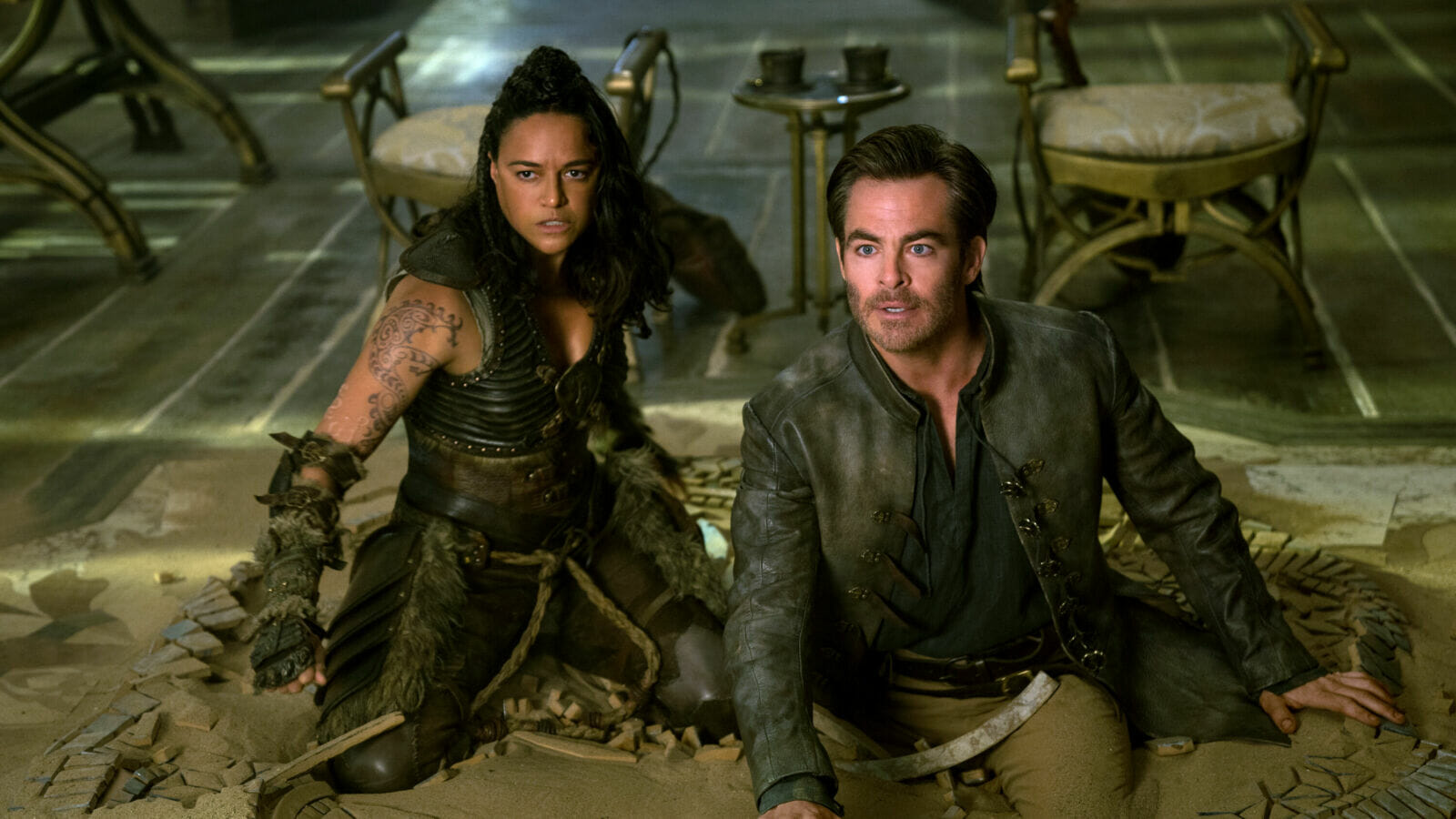My experience with Dungeons & Dragons extends to fitfully DMing (that’s “dungeon mastering”—essentially curating and narrating the adventure, for those uninitiated) my first game with a group of other brand-new players until our conflicting schedules and incapacity to grasp the ruleset led to several dead characters and an abandoned quest. But we had fun with our attempt: when your friends are game, role-playing is hilarious, especially when one of them insists on spending her turns cutting off her victims’ toes to make a necklace. Dungeons & Dragons: Honor Among Thieves tries to capture that silly spontaneity, leaning hard into the humor of its “fantasy action-adventure comedy” hybrid. That’s why it starts in prison, the funniest place in the world.
READ ALSO: Read all of Ryan Bordow’s movie reviews here
READ ALSO: Here’s how Arizona film incentives could attract filmmakers
Our duly incarcerated are thieves Edgin and Holga (Chris Pine and Michelle Rodriguez, maybe respectively; you never know with fantasy names), who’ve been arrested for trying to steal a tablet that can resurrect the dead. Edgin, you see, is burdened with the ultimate movie motivator—a dead wife—and he feels that only restoring her will heal his relationship with his daughter, Kira (Chloe Coleman). In the wake of Edgin’s arrest, however, Kira was taken in by ex-comrade Forge Fitzwilliam (Hugh Grant), who’s since weaseled his way into becoming Lord of Neverwinter, one of many titles that’ll give D&D players a start because they’ve heard it before. Forge, who has the tablet of resurrection but is up to undefined no good, has indoctrinated Kira against the now-escaped Edgin, so he and a party of unlikely heroes band together to swipe the tablet and seize custody of Kira outside the ruthless Forgotten Realms court system.
The crew is promising for a screwball escapade. Writer/directors Jonathan Goldstein and John Francis Daley (the latter of whom helped originate the D&D-playing nerd trope as Sam in Freaks and Geeks) had recently helmed Game Night, one of the best studio comedies in years, when they rescued D&D from development hell, and their fondness for visual humor strikes a great first impression. The film’s world, made up of physical sets and animatronics rather than the tears of overworked VFX artists, is endearingly scrappy, milking laughs from how deliberately cheap it looks next to its genre contemporaries. It’s cozy, in a way: a throwback to 80s adventure films that had kids building fantasy realms out of blankets and dining tables. There’s still some awful VFX—a third-act battle in Neverwinter resorts to vanishing thousands of citizens to sling spells across a barren CGI city—but the practical effects counteract them with character. Now if only the script felt so tailor-made.
Much praise for the film has focused on the story’s spontaneity, which aims to echo the tabletop strategy of winging it the whole way. It trades narrative momentum for narrative surprise: Edgin excels at “pivoting” when his plans go awry, permitting the script to detour anywhere at a moment’s notice, which is fun, but not super compelling. Nearly every conflict is solved by some goofy last-minute addition, erasing the potential for suspense. If surprise is a bomb going off and suspense is anticipating that one might go off, as Hitchcock once said, Dungeons & Dragons is the following exchange over and over: “oh no gang, it’s a wizard bomb!” “Is that like a bomb but [insert game reference here]?” “Yeah, good thing I have this wizard-bomb begone from when I visited [other game reference].” And then a zany visual effect as the bomb shrinks into a turnip or something. Captivating!
Without a real sense of danger, there’s no real sense of adventure. Chris Pine has compared D&D to Willow, The Princess Bride, and The NeverEnding Story, but its brand of winking fantasy lacks those films’ thrills. It fails to muster the baseline sensations of, say, concern for the characters (they’re all one-note and only in minor inner turmoil), fear that something will go wrong (something will go wrong, but it’ll go right with a joke), or wanting to visit this detailed, expansive world (you’re not movie-star attractive enough). It’s just so damn leisurely, bereft of verve or tension—more of a guided tour with jokes.
And on a conceptual level, that’s fine! It’s a comedy! I don’t need to be on the edge of my seat. But D&D isn’t funny enough to make up for its deficits. Its weirder formal edges are delightful—a dramatic crash zoom on an out-of-focus character stands out, as does a scene with a halfling that takes Lord of the Rings-style forced perspective to silly extremes—but the character banter is tired and uninspired, no matter how charming Chris Pine is, or how brazenly Michelle Rodriguez apes Dave Bautista’s Drax, or how desperately Hugh Grant tries to rehash his Paddington 2 villain with worse material. At some point, thinly sketched characters prancing between non-sequiturs (in both their dialogue and the plot beats) gets very old—and that point is before the two-hour mark.
It’s even earlier if you’re allergic to misogyny. Ever faithful to its source material, D&D undermines its women with a creeping ickiness. Party member Doric, played by It’s Sophia Lillis, has bizarrely little to say for the first half of the movie, like the writers forgot about her after setting up her requisite “will she/won’t she” (she will). And Edgin’s dead wife is sickeningly male-gazey—a perfect, gorgeous contrivance for Edgin’s maturation. I didn’t expect better, but better would’ve been nice.
That feeling is inescapable as the film squanders its potential. As my friends and I learned in my only Dungeons & Dragons quest, shooting the shit with your buddies does not an adventure make. You have to tell a good story—and for an adaptation of a universe with infinite stories, D&D tells a pretty lame one.
★★ (2/5)




